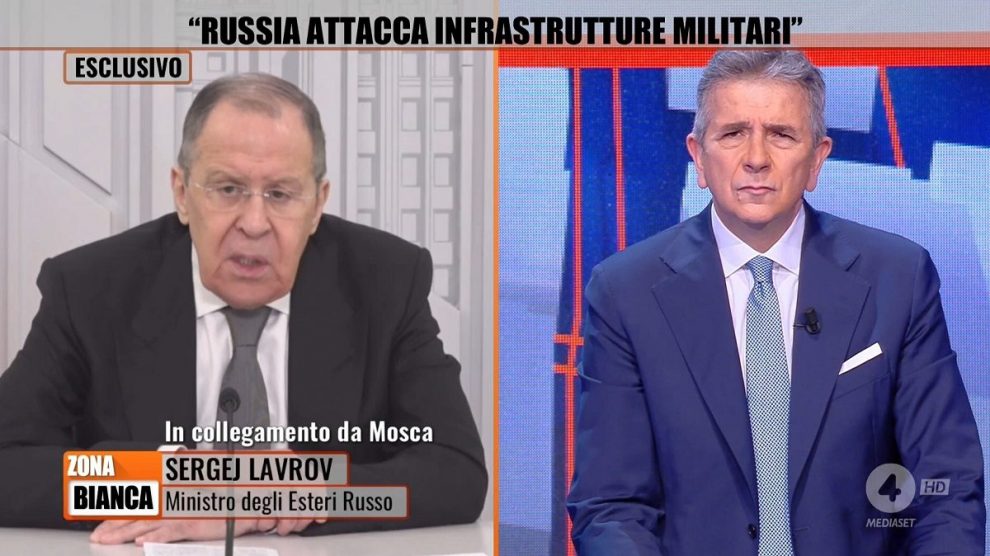The Kremlin channel. On Sunday evening, Russian Foreign Minister Sergey Lavrov was interviewed live on Italian TV – namely on Zona Bianca, a talk show on Mediaset-operated Rete 4 – in his first apparition on European TV since the invasion began.
But that wasn’t journalism. The 40-minute exchange between Mr Lavrov and the presenter, which aired during prime time, essentially consisted of the former blurting out Kremlin talking points, which oscillated between the nonsensical and the extremist, with the latter letting him speak uncontested.
- Enrico Borghi, a Democratic MP and member of Parliament’s intelligence watchdog COPASIR, told Decode39 that Mr Lavrov’s “soliloquy” was “worrisome” and pointed at the rise of Russian disinformation operations in Italy.
Conspiracies & doublespeak. Here’s a selection of the Russian FM’s most disturbing and outlandish claims. They are all rigorously unsupported by facts or evidence, and they fly directly in the face of what happened since February 24.
- Hitler was Jewish: Ukrainian President Volodymyr Zelensky supposedly totes an antisemitic and Nazi ideology, despite being Jewish himself. “But that amounts to nothing: [Adolf] Hitler, too, was of Jewish origin,” added Mr Lavrov, who also claimed that “all the worst antisemites are Jewish.”
- This trope, a veritable classic among the antisemitic hits, is straight out of a historical conspiracy theory that historians have repeatedly debunked. It was met with international condemnation.
- Bucha was staged. In the Kremlin’s book, the massacre unleashed by the Russian army on the inhabitants of Bucha (which is being investigated by international authorities as a war crime) was faked.
- The FM based his claim on another conspiracy theory; as he explained, proof of the deeds emerged only days after the town had been liberated. Compelling, were it not for the wealth of evidence, including satellite imagery, which demonstrates the contrary.
- Russia, the peacemaker: in Mr Lavrov’s narration, Russia “never ceased” to work towards a peaceful solution and avert nuclear escalation/WWIII, which contradicts his own claims. It also never intended to topple Mr Zelensky and enact a regime change: Moscow only wants him to “interrupt hostilities” and “release the civilians” (whatever that means), as its sole concern is “ensuring the safety of pro-Russian Ukrainians in the east of the country”. More still, the Russian army only targets military objectives.
Playing it safe. Arguably, Mr Lavrov chose the right setting for his televised propaganda spectacle, knowing full well that the presenter wouldn’t have given him a hard time. Since the beginning of the war, Italian talk shows have been a hotbed of manifestly pro-Russian misinformation.
- The presenter, Giuseppe Brindisi, only asked “primer” questions to initiate the next stage of Mr Lavrov’s speech and even wished him buon lavoro (roughly “good luck with your work”) at the end of the interview.
Why did it happen? Setting aside the historical and cultural ties between Rome and Moscow, which explain only partly the overt Russophilia of some Italians, a years-long barrage of Russian and anti-establishment disinformation primed a portion of the Italian audience to be receptive to the Kremlin’s narrations.
- Notably, Mr Lavrov expressed disappointment at Italy’s position on the war in Ukraine, stating that Moscow was “surprised” at first – which hints at the Kremlin’s belief that Italy was still the EU’s soft underbelly when it came to Russia.
- Experts and onlookers have also been remarking the poor quality of the Italian talk shows, where networks favour audience share figures and sensationalisation (which leads to bothsideism) over journalistic quality…
- …and poor editorial choices. Suffice it to say that the Kremlin’s propagandist-in-chief Vladimir Solovyev has been repeatedly invited and interviewed across Italy’s public channels.
Fighting back. Mr Borghi stressed that the information battlefield is crucial and that COPASIR works daily to counter it. The watchdog has announced it will hold auditions with the heads of Italy’s public television service, RAI, and the communications authority AGCOM.
Image: Zona Bianca, Rete 4 (Mediaset)





